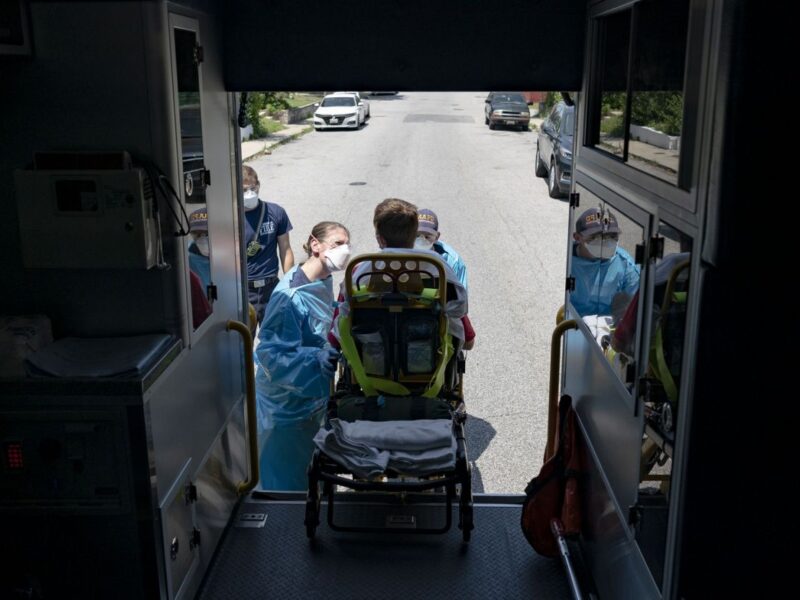
It was a rash that tipped Dr. Alisa Femia off.
Femia, director of inpatient dermatology at NYU Langone Health in New York City, was looking at a patient’s chart, which included several photos of the 45-year-old man who had, in recent weeks, cared for his wife while she was sick with Covid-19. The man had dusky-red circular patches on the palms of his hands and the soles of his feet. His eyes were pink, and his lips were extremely chapped.
Full coverage of the coronavirus outbreak
His body was erupting with the kind of extreme inflammation noted almost exclusively in children at the time.
“Before I even saw the patient,” Femia recalled, “I said: ‘This hasn’t been reported yet. This must be MIS-A.'”
MIS-A stands for “multi-system inflammatory syndrome in adults.” When the condition was identified in children this spring, it was named MIS-C, with the C standing for “children.”
Kids were developing dangerous inflammation around the heart and other organs, often weeks after their initial infections with SARS-CoV-2, the virus that causes Covid-19.
The Centers for Disease Control and Prevention alerted physicians to MIS-C in May. As of Oct. 1, the CDC had reported 1,027 confirmed cases of MIS-C, with more cases under investigation. Twenty children have died.
In some cases, the children developed rashes like the one Femia noted in her adult patient.
Femia and colleagues published details of the case in The Lancet in July to alert other physicians to be on the lookout for similar patients.
“The skin’s right there in front of your eyes,” Femia said. “You can’t not see it.”
But many doctors may not, in fact, be recognizing the condition in adults. Just a few dozen cases of MIS-A have been reported. And not all patients have obvious rashes.
Dr. Sapna Bamrah Morris, clinical lead for the Health Care Systems and Worker Safety Task Force, part of the CDC’s Covid-19 response, detailed 27 cases in a report the agency published last week.
MIS-A’s “true prevalence is unknown,” Morris said. “We have to get physicians realizing that. It may be rare, but we don’t know. It might be more common than we think.”
Story continues
Negative tests
Part of the problem is that the virus has been circulating among humans for less than a year. Doctors worldwide are still learning about how SARS-CoV-2 acts in patients.
Typically, severely ill Covid-19 patients tend to arrive at the hospital because they’re having trouble breathing. That hasn’t been the case with MIS-A.
Many MIS-A patients report fevers, chest pain or other heart problems, diarrhea or other gastrointestinal issues — but not shortness of breath. And diagnostic tests for Covid-19 tend to be negative.
Instead, patients will test positive for Covid-19 antibodies, meaning they were infected two to six weeks previously, even if they never had symptoms.
“Just because someone doesn’t present with respiratory symptoms as their primary manifestation does not mean that what they’re experiencing isn’t as a result of Covid-19,” Morris said.
The illness can be life-threatening. Patients usually have some kind of severe dysfunction of at least one organ, such as the heart or the liver.
Ten patients in the CDC report needed to be hospitalized in intensive care units. Some needed to be put on ventilators. Two have died.
What’s more, the CDC report showed that members of racial and ethnic minority groups appear to be disproportionately affected. Nearly all patients with MIS-A were African American or Hispanic. But far too few cases have been reported to fully understand the underlying mechanisms at play.
While some kind of genetic link may be possible, Covid-19 has been shown to “disproportionately affect underrepresented minorities, probably due to socioeconomic factors,” Femia said. Underlying health conditions that raise the risk for Covid-19 complications, such as obesity and Type 2 diabetes, also tend to be more prevalent among members of racial and ethnic minority groups.
Image: Emergency medical technicians with a patient (Maria Alejandra Cardona / Reuters)
Over the summer, doctors in Florida started seeing surges in Covid-19 cases. Dr. Lilian Abbo, chief of infection prevention for Jackson Health System in Miami, recalls a “very high volume of people coming through our emergency departments or hospitals getting very sick.”
The most sensitive and reliable test for Covid-19, called a PCR test, wasn’t always available, and it could take several days to return results. Abbo turned to antibody testing to get the influx of patients triaged to a Covid-19 unit or elsewhere in the health system.
People generally develop antibodies to an infection within about a week or so. At least it would give Abbo and her colleagues an indication that Covid-19 was involved somehow in their patients’ symptoms, she reasoned.
It was then that Abbo discovered a subset of patients who were critically ill after having had Covid-19, but without the telltale pulmonary issues of an acute infection.
“We were a little disconcerted,” Abbo said. “We would do the molecular PCR tests, and they would be negative. Then the antibody tests were positive.”
Further blood tests revealed extremely high levels of inflammation in the body.
What’s more, while most severely ill Covid-19 patients tend to be over age 65 or to have multiple underlying health problems, these patients “were younger people that you would expect to not get sick,” Abbo said.
“That’s what caught our attention.”
MIS-A treatment
There’s no proven treatment for MIS-A. “We need to recognize this syndrome and develop data” to figure out which therapies may be most effective,” Abbo said. “We are all just shooting blind.”
Dr. Jill Weatherhead, an assistant professor of infectious diseases and tropical medicine at Baylor College of Medicine in Houston, points out that the CDC case reports show that doctors have tried a variety of medications for MIS-A patients, including steroids and drugs that might affect the immune system, called interleukin-6 inhibitors.
“The problem with these diseases is that we don’t know the mechanisms that are causing MIS-A and MIS-C,” Weatherhead said. “It’s difficult to know what the standard treatment should be until we have more information.”
In children, MIS-C is generally treated with intravenous immunoglobulin, a blood product containing a variety of antibodies. That can be used for adults, too, but the effects are largely unproven.
Intravenous immunoglobulin, or IVIG, is different from another blood-derived antibody treatment, convalescent plasma. The latter is taken from patients who have recovered from Covid-19 and have antibodies specifically targeted to the virus in their blood. IVIG, on the other hand, is more of a hodgepodge of antibodies that aren’t specific to the coronavirus.
The thinking is that MIS-A patients already have Covid-19 antibodies, so adding more with convalescent plasma is unlikely to help.
The current theory for MIS-A patients is that “the infection, as far as we know, is gone,” said Dr. Hugh Cassiere, director of critical care services for Sandra Atlas Bass Heart Hospital at North Shore University Hospital, part of Northwell Health, on Long Island, New York.
“It’s the antibodies that have been produced that seem to be causing a problem,” he said.
Cassiere was part of a large team of physicians who treated the surge of Covid-19 patients in New York this spring. Even though MIS-A hadn’t been identified at the time, Cassiere is convinced that such patients existed all along.
“We were seeing patients who admitted to the ICU with organ failure,” Cassiere said. They would test negative for Covid-19, he said, but test positive for Covid-19 antibodies, suggesting they’d been infected previously.
“You look back, and they probably had this multi-system inflammatory syndrome,” Cassiere said. “We didn’t have all the pieces to put together.”
Download the NBC News app for full coverage of the coronavirus outbreak
Months later, the puzzle is beginning to reveal itself. But it will take an all-hands-on-deck approach to identify patients with MIS-A.
“This needs to be in the forefront of every intensive care unit physician’s mind who’s seeing patients, especially when they have Covid-19 antibodies,” Cassiere said.
Given Femia’s experience, that includes those who specialize in dermatology.
“This is really the beauty of medicine, where, for this syndrome, many different specialists need to come together to help make the diagnosis,” Femia said.
Physicians worry that many MIS-A patients will go undetected — and perhaps untreated.
“There’s not enough data for me to tell you what the long-term effects of this could be,” Cassiere said. “This may be the tip of the iceberg. That’s what I’m worried about.”
Follow NBC HEALTH on Twitter & Facebook.






Leave a Reply